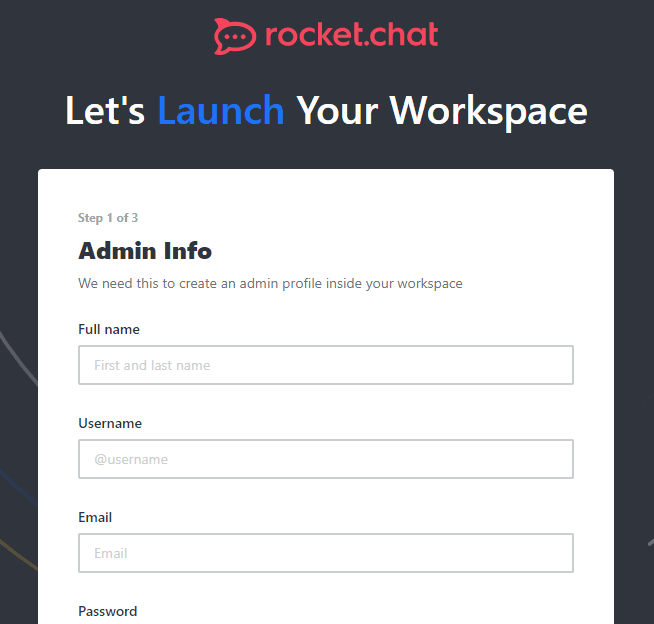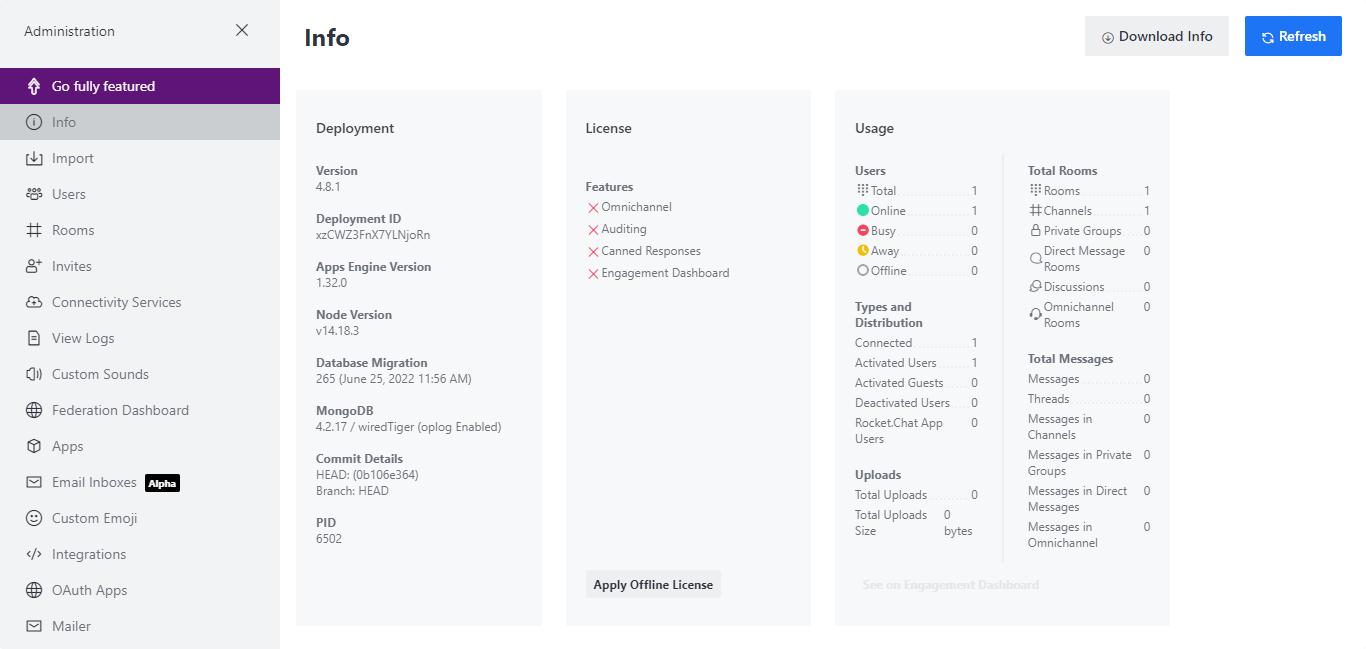How To Install Rocket.Chat on Debian 13

Team communication has evolved dramatically in recent years, with organizations seeking robust, self-hosted solutions that provide complete control over their data and infrastructure. Rocket.Chat stands out as a powerful open-source alternative to proprietary platforms like Slack and Microsoft Teams. This comprehensive guide walks you through installing Rocket.Chat on Debian 13, ensuring you have a fully functional communication platform tailored to your organization’s needs.
By following this tutorial, you’ll establish a secure, scalable messaging server that supports real-time chat, file sharing, video conferencing, and extensive customization options. Debian 13’s stability and security make it an ideal foundation for hosting business-critical communication infrastructure.
What is Rocket.Chat?
Rocket.Chat represents a complete communication ecosystem designed for modern teams and organizations. This open-source platform delivers enterprise-grade messaging capabilities while maintaining full data ownership and customization flexibility. Unlike cloud-hosted solutions, Rocket.Chat allows organizations to deploy their communication infrastructure on-premises or in private cloud environments.
The platform supports unlimited users, channels, and integrations without recurring subscription fees. Key features include real-time messaging, voice and video calling, screen sharing, file uploads, and robust API integration capabilities. Organizations benefit from advanced security features, including end-to-end encryption, two-factor authentication, and comprehensive audit trails.
Rocket.Chat’s modular architecture supports extensive customization through themes, plugins, and custom integrations. The platform scales efficiently from small teams to enterprise deployments serving thousands of users. Its webhook system enables seamless integration with existing business tools, including project management software, monitoring systems, and development workflows.
Manual installation provides maximum control over system configuration, security settings, and performance optimization. This approach ensures compatibility with existing infrastructure while maintaining complete administrative control over updates and maintenance schedules.
Prerequisites and System Requirements
Hardware Requirements
Successful Rocket.Chat deployment requires adequate system resources to handle user load and data processing demands. Minimum hardware specifications include 2 CPU cores, 4GB RAM, and 20GB storage space. However, production environments benefit significantly from enhanced specifications.
Recommended configurations start with 4 CPU cores, 8GB RAM, and 50GB storage for organizations supporting up to 100 concurrent users. Enterprise deployments require additional resources based on expected user activity, file storage requirements, and integration complexity.
Storage considerations extend beyond basic installation requirements. MongoDB databases grow substantially with user activity, file uploads, and message history. Plan for at least 1GB per 1,000 users monthly, with additional capacity for media files and attachment storage.
Network connectivity must support sustained bandwidth for real-time messaging, file transfers, and video conferencing. Ensure reliable internet access with sufficient upstream capacity for remote user connections.
Software Prerequisites
Debian 13 installation requires administrative privileges through sudo access or direct root login capabilities. Fresh system installations provide optimal environments, minimizing potential conflicts with existing software packages or configuration settings.
Internet connectivity enables package downloads, dependency resolution, and security updates throughout the installation process. Stable connections prevent installation interruptions that could corrupt system configurations or leave installations incomplete.
Basic command-line proficiency ensures smooth navigation through terminal-based installation procedures. Familiarity with text editors, file permissions, and service management concepts significantly improves installation success rates and troubleshooting effectiveness.
Pre-Installation System Preparation
System Updates
Begin installation by updating Debian 13 package repositories and installed software to latest versions. This process ensures compatibility with Rocket.Chat dependencies and addresses potential security vulnerabilities.
sudo apt update
sudo apt upgrade -yPackage updates may require system restarts, particularly when kernel updates occur. Plan installation timing accordingly to accommodate potential downtime requirements.
Installing Essential Packages
Rocket.Chat installation depends on several system packages for compilation, image processing, and network operations. Install required packages using Debian’s package manager:
sudo apt install -y curl build-essential graphicsmagickThe curl package enables secure file downloads from remote repositories. build-essential provides compilation tools necessary for building native Node.js modules. graphicsmagick handles image processing operations for avatar generation and media optimization.
Package installation failures often indicate repository connectivity issues or conflicting software versions. Resolve conflicts by removing incompatible packages or updating repository configurations.
Firewall Configuration
Configure UFW (Uncomplicated Firewall) to secure system access while allowing necessary Rocket.Chat connections. Enable firewall protection with appropriate port access:
sudo ufw enable
sudo ufw allow 22/tcp
sudo ufw allow 3000/tcpPort 22 maintains SSH administrative access, while port 3000 serves Rocket.Chat web interface traffic. Additional ports may be required for SSL certificates, reverse proxy configurations, or custom integrations.
Security considerations include restricting administrative access to specific IP addresses and implementing fail2ban protection against brute-force attacks. Monitor firewall logs regularly to identify potential security threats or configuration issues.
Installing and Configuring MongoDB
MongoDB Installation Process
MongoDB serves as Rocket.Chat’s primary database engine, storing user data, messages, and configuration settings. Install MongoDB using official repository packages to ensure version compatibility and security updates.
Add MongoDB repository signing key and package source:
curl -fsSL https://pgp.mongodb.com/server-7.0.asc | sudo gpg --dearmor -o /usr/share/keyrings/mongodb-server-7.0.gpg
echo "deb [ signed-by=/usr/share/keyrings/mongodb-server-7.0.gpg ] http://repo.mongodb.org/apt/debian bookworm/mongodb-org/7.0 main" | sudo tee /etc/apt/sources.list.d/mongodb-org-7.0.listUpdate package repositories and install MongoDB:
sudo apt update
sudo apt install -y mongodb-orgMongoDB version compatibility remains critical for Rocket.Chat functionality. Verify installation with compatible versions to prevent runtime errors or data corruption issues.
MongoDB Configuration
Edit MongoDB configuration file to enable replication and optimize performance settings:
sudo nano /etc/mongod.confConfigure essential settings for Rocket.Chat compatibility:
storage:
engine: wiredTiger
replication:
replSetName: rs01
net:
port: 27017
bindIp: 127.0.0.1The wiredTiger storage engine provides optimal performance and compression for Rocket.Chat workloads. Replication configuration with replica set name rs01 enables MongoDB features required by Rocket.Chat’s real-time functionality.
Network binding to localhost (127.0.0.1) restricts database access to local applications, enhancing security while maintaining necessary connectivity for Rocket.Chat operations.
MongoDB Service Management
Enable and start MongoDB service for automatic startup and immediate availability:
sudo systemctl enable mongod
sudo systemctl start mongod
sudo systemctl status mongodService status verification ensures proper MongoDB initialization before proceeding with replica set configuration. Address any startup errors through log analysis and configuration adjustments.
Replica Set Initialization
Initialize MongoDB replica set using mongosh client interface:
sudo mongoshExecute replica set initialization within MongoDB shell:
rs.initiate()Replica set configuration enables change streams and oplog functionality required for Rocket.Chat’s real-time features. Verify successful initialization through replica set status commands:
rs.status()
exitInstalling Node.js and Deno
Node.js Installation Options
Rocket.Chat requires specific Node.js versions for optimal compatibility and performance. Install Node.js through NodeSource repository for latest stable releases:
curl -fsSL https://deb.nodesource.com/setup_18.x | sudo -E bash -
sudo apt-get install -y nodejsNodeSource repository provides actively maintained Node.js packages with security updates and performance improvements. Alternative installation methods include version managers like nvm or n for development environments requiring multiple Node.js versions.
Verify Node.js and npm installation success:
node --version
npm --versionVersion verification confirms proper installation and identifies potential compatibility issues before proceeding with Rocket.Chat deployment.
Deno Installation and Requirements
Recent Rocket.Chat versions require Deno runtime for specific functionality components. Install Deno version 1.37.1 or higher, ensuring compatibility with version 2.0.0 limitations:
curl -fsSL https://deno.land/x/install/install.sh | shAdd Deno to system PATH for global accessibility:
echo 'export PATH="$HOME/.deno/bin:$PATH"' >> ~/.bashrc
source ~/.bashrcVerify Deno installation and version compatibility:
deno --versionDeno runtime provides modern JavaScript and TypeScript execution capabilities, supporting advanced Rocket.Chat features and integrations.
Version Verification
Confirm all runtime environments meet Rocket.Chat requirements before proceeding with application installation. Version conflicts may cause runtime errors, deployment failures, or reduced functionality.
Document installed versions for future reference and troubleshooting purposes. Maintain version consistency across development, staging, and production environments to ensure reliable deployments.
Downloading and Installing Rocket.Chat
Choosing Rocket.Chat Version
Select appropriate Rocket.Chat release based on stability requirements and feature needs. Stable releases provide thoroughly tested functionality suitable for production environments, while latest releases include cutting-edge features with potential compatibility risks.
Review release notes for version-specific requirements, bug fixes, and security updates. Consider long-term support versions for enterprise deployments requiring extended maintenance windows.
Download Process
Download Rocket.Chat release archive from official distribution channels:
curl -L https://releases.rocket.chat/7.9.3/download -o /tmp/rocket.chat.tgzVerify download integrity through checksum validation when available. Corrupted downloads may cause installation failures or runtime instability issues.
File Extraction and Setup
Extract downloaded archive and prepare installation directory:
cd /tmp
tar -xzf rocket.chat.tgz
sudo mv bundle /opt/Rocket.ChatNavigate to installation directory and install production dependencies:
cd /opt/Rocket.Chat/programs/server
sudo npm install --productionDependency installation downloads and compiles native modules required for Rocket.Chat functionality. Network connectivity and system resources significantly impact installation duration and success rates.
Monitor installation progress for error messages indicating missing dependencies, compilation failures, or network connectivity issues. Address problems immediately to prevent incomplete installations.
User and Permission Configuration
Creating Rocket.Chat System User
Establish dedicated system user for enhanced security and process isolation:
sudo useradd -M rocketchat
sudo usermod -L rocketchatThe -M flag prevents home directory creation, while -L locks the account password, preventing direct login access. System users enhance security by limiting privileges and isolating application processes.
Setting Proper Permissions
Configure appropriate file ownership and permissions for Rocket.Chat installation:
sudo chown -R rocketchat:rocketchat /opt/Rocket.ChatProper ownership ensures Rocket.Chat processes can access necessary files while preventing unauthorized modifications. Restrictive permissions enhance system security and prevent privilege escalation attacks.
Verify permission settings through directory listing and file access testing. Incorrect permissions may cause startup failures, file access errors, or security vulnerabilities.
Creating and Configuring the System Service
Systemd Service File Creation
Create systemd service configuration for automatic Rocket.Chat startup and process management:
sudo nano /etc/systemd/system/rocketchat.serviceConfigure service parameters for optimal operation:
[Unit]
Description=Rocket.Chat server
After=network.target mongod.service
[Service]
ExecStart=/usr/local/bin/node /opt/Rocket.Chat/main.js
StandardOutput=syslog
StandardError=syslog
SyslogIdentifier=rocketchat
User=rocketchat
Environment=MONGO_URL=mongodb://localhost:27017/rocketchat?replicaSet=rs01
Environment=MONGO_OPLOG_URL=mongodb://localhost:27017/local?replicaSet=rs01
Environment=ROOT_URL=http://localhost:3000
Environment=PORT=3000
[Install]
WantedBy=multi-user.targetEnvironment Variable Configuration
Environment variables control Rocket.Chat behavior and integration settings. Essential variables include database connection strings, server URLs, and port configurations.
MONGO_URL specifies primary database connection with replica set parameter. MONGO_OPLOG_URL enables real-time change detection through MongoDB oplog monitoring. ROOT_URL defines base URL for link generation and external access.
Additional environment variables support custom configurations, including SMTP settings, file storage options, and integration endpoints. Document environment changes for troubleshooting and deployment consistency.
Service Management Commands
Enable and activate Rocket.Chat service for automatic startup:
sudo systemctl daemon-reload
sudo systemctl enable rocketchat
sudo systemctl start rocketchatMonitor service status and startup progress:
sudo systemctl status rocketchatService logs provide detailed information about startup processes, error conditions, and runtime behavior. Access logs through journalctl for comprehensive troubleshooting capabilities:
sudo journalctl -u rocketchat -fSSL Certificate Configuration with Let’s Encrypt
Installing Certbot
Secure communications require SSL/TLS certificates for encrypted data transmission. Install Certbot for automated Let’s Encrypt certificate management:
sudo apt install -y certbotLet’s Encrypt provides free SSL certificates with automated renewal capabilities. Certificate validation requires public domain names and accessible web servers for domain verification processes.
Certificate Generation
Generate SSL certificates for your domain:
sudo certbot certonly --standalone -d your-domain.comStandalone authentication temporarily binds port 80 for domain validation. Ensure port availability and DNS resolution before certificate generation attempts.
Nginx/Apache Integration
Implement reverse proxy configuration for SSL termination and improved performance. Nginx configuration example:
server {
listen 443 ssl http2;
server_name your-domain.com;
ssl_certificate /etc/letsencrypt/live/your-domain.com/fullchain.pem;
ssl_certificate_key /etc/letsencrypt/live/your-domain.com/privkey.pem;
location / {
proxy_pass http://localhost:3000;
proxy_set_header Host $host;
proxy_set_header X-Real-IP $remote_addr;
proxy_set_header X-Forwarded-For $proxy_add_x_forwarded_for;
proxy_set_header X-Forwarded-Proto $scheme;
}
}Reverse proxy configurations enhance security, enable SSL termination, and provide load balancing capabilities for high-availability deployments.
Initial Rocket.Chat Setup and Configuration
Web Interface Access
Access Rocket.Chat installation through web browser navigation to configured server address. Initial setup wizard guides administrators through essential configuration steps.
Navigate to http://your-server-ip:3000 or configured domain name. First-time access triggers setup wizard requiring administrator account creation and basic server configuration.

Essential Configuration Steps
Complete initial configuration through web interface setup wizard. Create administrator account with strong authentication credentials and comprehensive contact information.
Configure server settings including organization name, server URL, and default language preferences. Email configuration enables user notifications, password resets, and integration features.
Establish user registration policies balancing accessibility with security requirements. Options include open registration, invitation-only access, or domain-restricted enrollment.

Troubleshooting Common Issues
Installation Problems
MongoDB connection failures often result from incorrect replica set configuration or network binding issues. Verify MongoDB service status and configuration file syntax before troubleshooting Rocket.Chat connectivity.
Node.js version conflicts may cause compilation errors or runtime failures. Ensure compatible Node.js versions through official documentation reference and version verification commands.
Permission-related errors frequently occur with incorrect file ownership or restrictive access controls. Review file permissions and user configurations to resolve access denied messages.
Service Issues
Service startup failures typically indicate configuration errors, missing dependencies, or resource constraints. Analyze systemd logs and service output for specific error messages and resolution guidance.
Log file locations include systemd journal entries, Rocket.Chat application logs, and MongoDB diagnostic output. Comprehensive log analysis reveals root causes and solution pathways for complex issues.
Port binding problems may result from conflicting services, firewall restrictions, or network configuration issues. Verify port availability and network connectivity before addressing application-specific problems.
Performance Optimization
Memory usage optimization involves MongoDB configuration tuning, Node.js heap size adjustments, and system resource allocation. Monitor resource utilization patterns to identify optimization opportunities.
MongoDB indexing significantly impacts query performance and response times. Review database indexes and query patterns to optimize data access operations.
Log rotation prevents disk space exhaustion and maintains system performance. Configure automatic log rotation for Rocket.Chat, MongoDB, and system services.
Security Best Practices
System Security
Firewall configuration should restrict access to essential ports while preventing unauthorized connections. Implement intrusion detection systems and automated security scanning for comprehensive protection.
User privilege management follows least-privilege principles, granting minimal necessary access rights. Regular privilege audits identify excessive permissions and potential security vulnerabilities.
Security updates require systematic application across operating system, application dependencies, and Rocket.Chat releases. Automated update mechanisms reduce exposure windows while maintaining system stability.
Rocket.Chat Security
Administrative user management involves strong authentication requirements, session management, and access logging. Implement two-factor authentication for enhanced administrative account protection.
File upload restrictions prevent malicious content distribution and resource exhaustion attacks. Configure appropriate file size limits, type restrictions, and scanning capabilities.
Two-factor authentication enhances user account security through additional verification requirements. Support multiple authentication methods including mobile apps, SMS, and hardware tokens.
Maintenance and Updates
Regular Maintenance Tasks
Database backup procedures ensure data protection and disaster recovery capabilities. Implement automated backup schedules with offsite storage and recovery testing protocols.
Log management prevents disk space exhaustion while maintaining audit trail capabilities. Configure log rotation, compression, and retention policies based on compliance requirements.
System monitoring encompasses resource utilization, performance metrics, and security events. Implement comprehensive monitoring solutions with alerting capabilities for proactive issue resolution.
Update Procedures
Backup procedures should precede all update operations to enable rapid rollback capabilities. Test backup restoration processes regularly to verify data integrity and recovery procedures.
Update process walkthrough includes dependency verification, configuration backup, and staged deployment procedures. Document update steps and validation criteria for consistent execution.
Rollback procedures provide rapid recovery from failed updates or compatibility issues. Maintain previous version backups and configuration snapshots for immediate restoration capabilities.
Congratulations! You have successfully installed Rocket.Chat. Thanks for using this tutorial for installing Rocket.Chat on Debian 13 “Trixie” Linux system. For additional help or useful information, we recommend you check the official Rocket.Chat website.